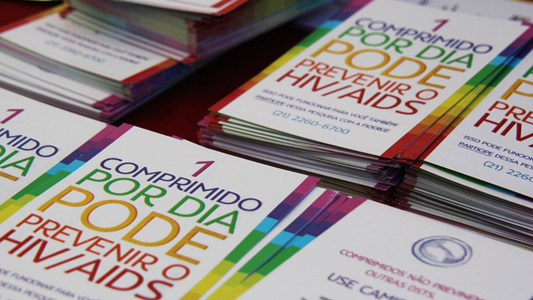'Lancet HIV' highlights the results of PrEP Brazil

08/06/2018
Juana Portugal (INI/Fiocruz)
The study of the use of the Pre-Exposure Prophylaxis (PrEP) to HIV, coordinated by the researcher Beatriz Grinsztejn, head of the Laboratory of Clinical Research in STD and AIDS of the National Institute of Infectious Diseases (INI/Fiocruz), was the subject matter of an editorial and article published in February in one of the most prestigious international scientific journals, The Lancet HIV. The editorial ¡PrEP Ya! Latin America wants PreP, and Brazil leads the way, signed by Jerome Galea (Harvard), Ricardo Baruch (Instituto Nacional de Salud Pública/Mexico) and Brandon Brown (University of California), highlights the impact of the study, a milestone in Brazil's pioneering and successful trajectory in the treatment and prevention of HIV in Latin America. The results are presented in detail in the article Retention, engagement, and adherence to pre-exposure prophylaxis for men who have sex with men and transgender women in PrEP Brasil: 48-week results of a demonstration study, signed by Grinsztejn and the team members who participated in the project.
PrEP Brazil followed 450 volunteers for 48 weeks and focused on men who have sex with men, transvestites and transsexual women who are vulnerable to HIV. Participants received one tablet per day of emtricitabine + tenofovir, distributed under the daily conditions of the Unified Health System (SUS), and were followed up for treatment adherence assessment, sexual behavior trends, HIV incidence, sexually transmitted diseases and drug use. At the end of this period, the effectiveness of this prevention strategy in the context of SUS was demonstrated, highlighting the good adherence of the volunteers. The results of PrEP Brazil contributed significantly to the incorporation of PrEP in SUS as a public policy.
The hope that PrEP Brazil will be a watershed in the region and inspire other countries to incorporate this prevention strategy for the most vulnerable populations to get infected with HIV is recorded in the editorial. Three Latin American and Caribbean countries are currently implementing demonstration studies, and another seven are in the planning phase.
PrEP
Pre-exposure prophylaxis (PrEP) to human immunodeficiency virus (HIV) is a prevention strategy that consists of the daily use of an antiretroviral drug by non-HIV infected persons. Its proper use reduces the risk of getting the infection by more than 90%. Brazil is a pioneer in Latin America and the Caribbean by adopting PrEP as a public policy.
From 2018 the strategy is the object of a new study that follows the implementation of PrEP in Brazil and the development of demonstration studies in Mexico and Peru, ImPrEP.
Funded by UNITAID and supported by Fiocruz Foundation for the Scientific and Technological Development in Health (Fiotec), the Project for the Implementation of HIV Pre-exposure Prophylaxis in Brazil, Mexico and Peru (ImPrEP) will last for three years, benefiting 7,500 men who have sex with men, transvestites and transsexual women, and will be conducted by a consortium formed by research centers and Ministries of Health of the three participating countries. In addition to expanding access to PreP, the project will also increase the diagnosis of HIV infection, Hepatitis B and C, Syphilis, HIV and other sexually transmitted diseases, and will provide information to improve the implementation of PrEP as a public policy.
The Lancet
Founded in 1823 by English physician Thomas Wakley (1795 - 1862), the scientific journal The Lancet began as an independent international journal about medicine in general. Created with the purpose of making science accessible, the publication grew over time and became a family of journals covering the following topics: Child and Adolescent Health, Diabetes and Endocrinology, Gastroenterology and Hepatology, Global Health, Hematology, HIV, Infectious Diseases, Neurology, Oncology, Planetary Health, Psychiatry, Public Health and Respiratory Medicine.


